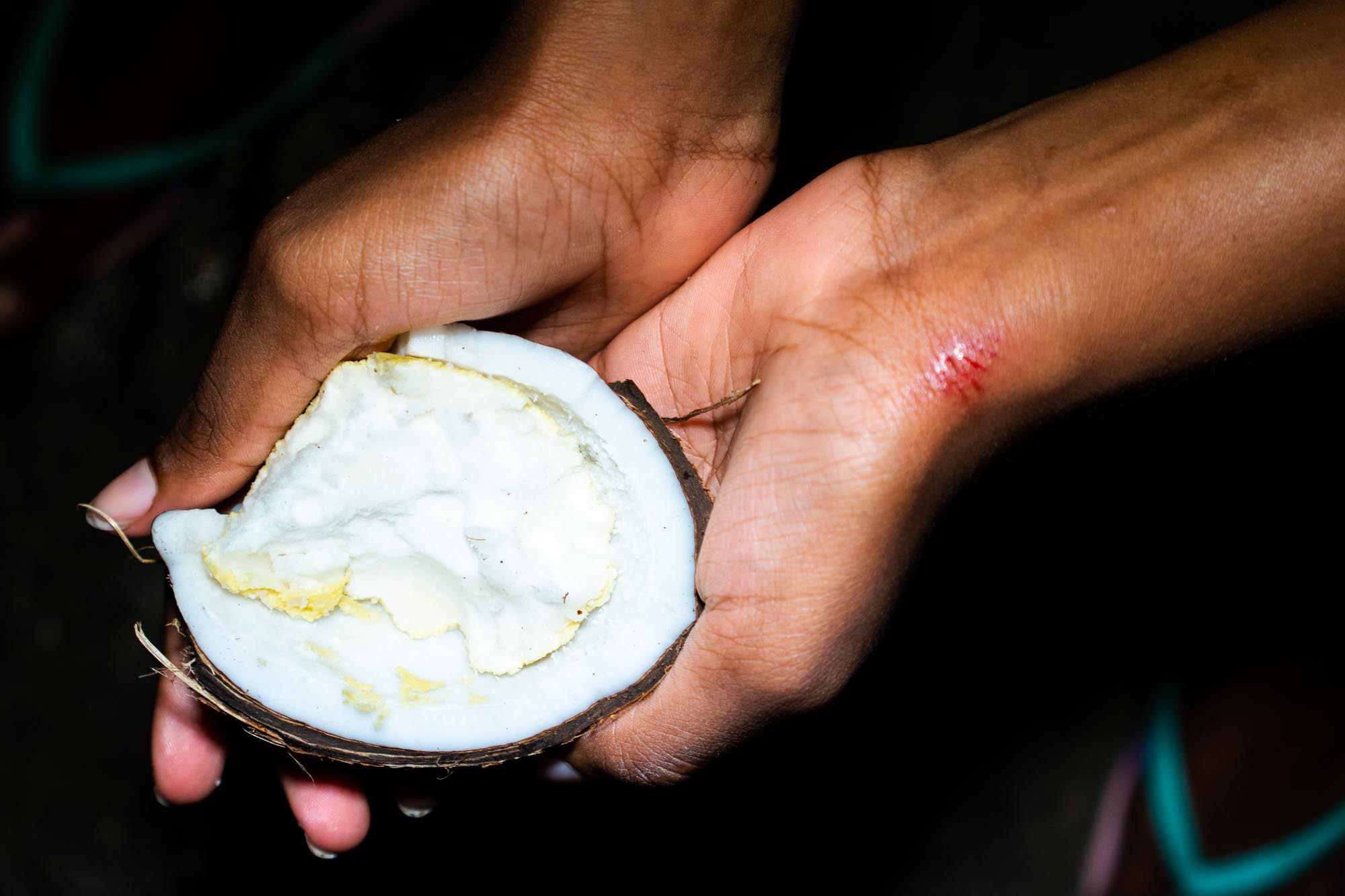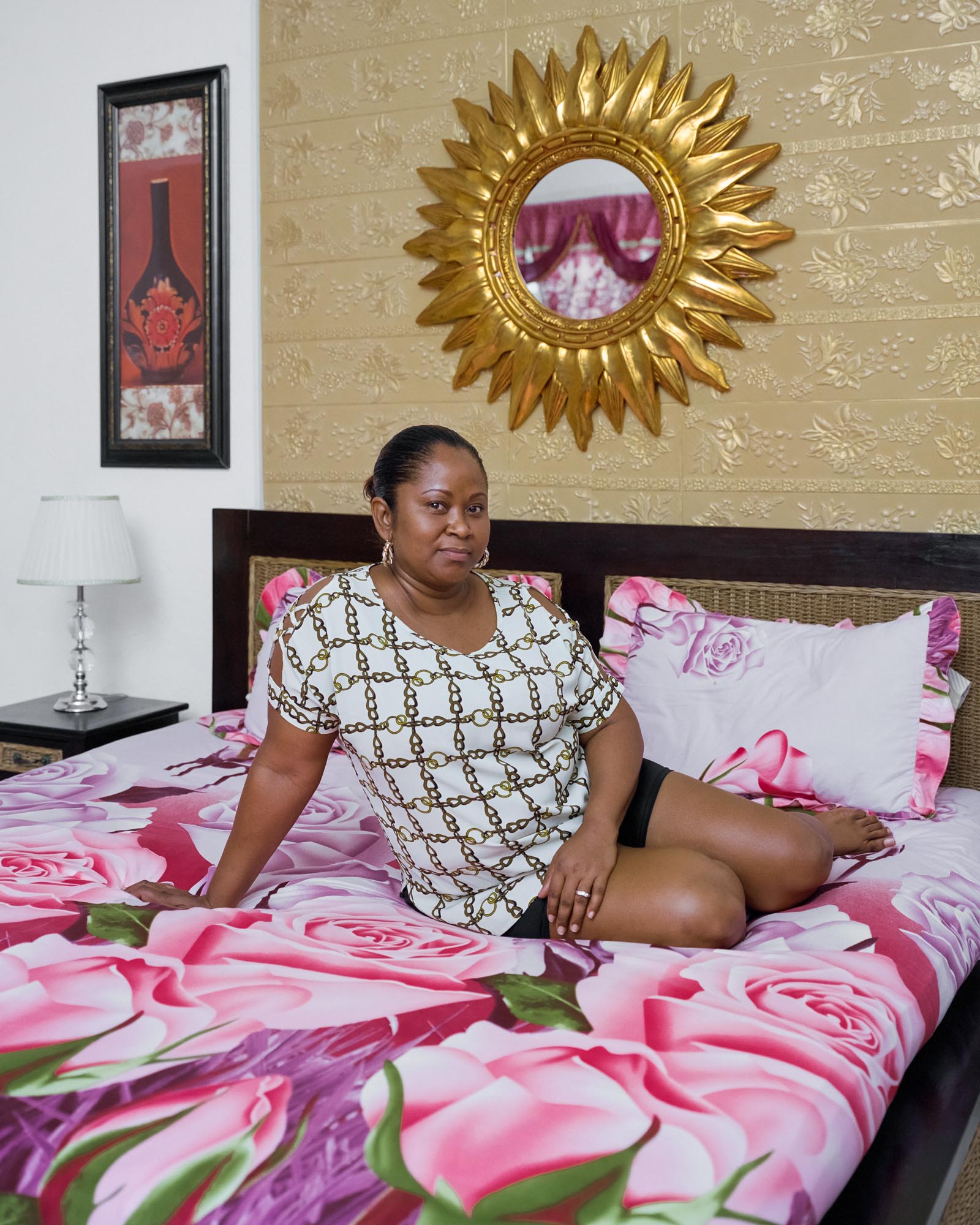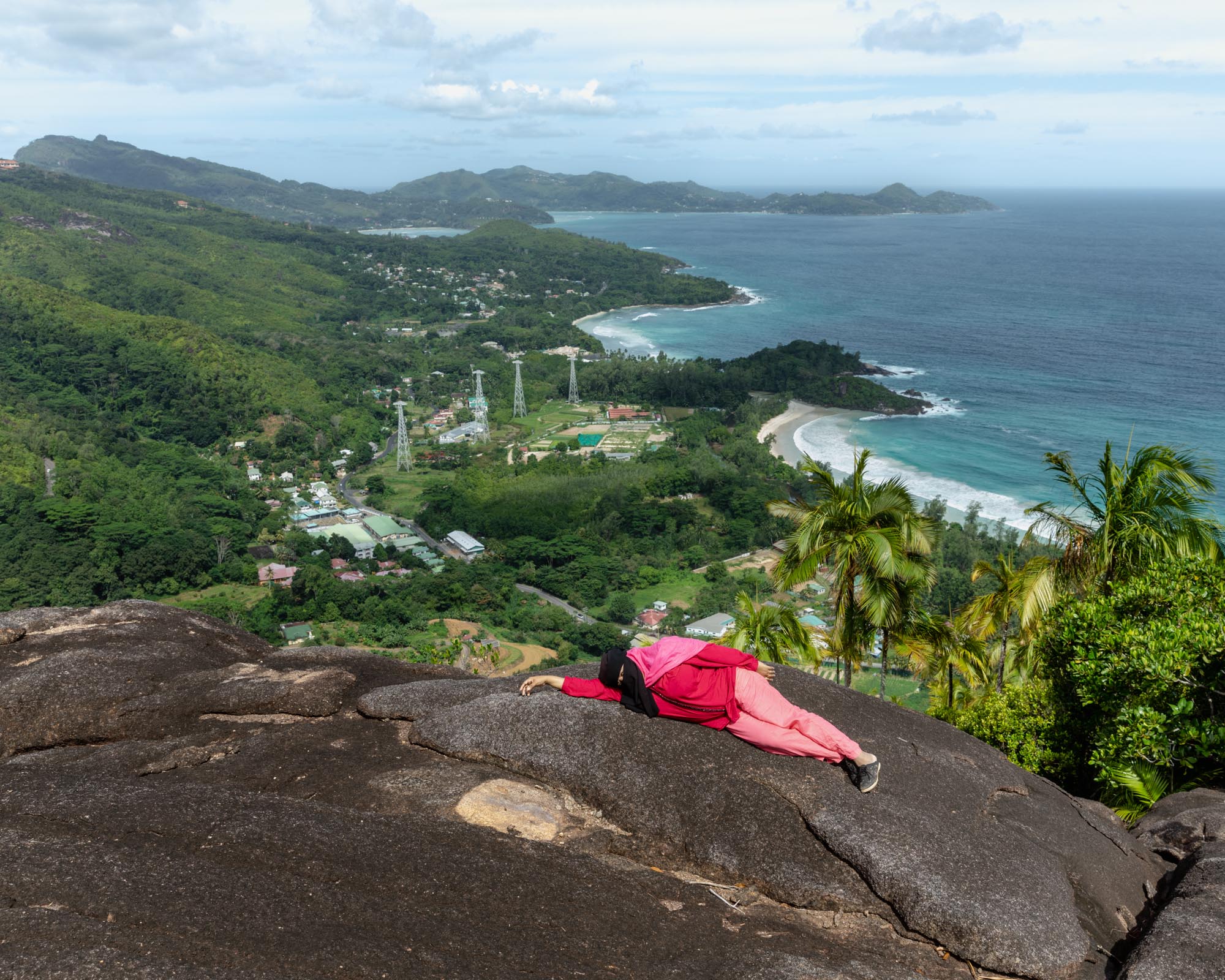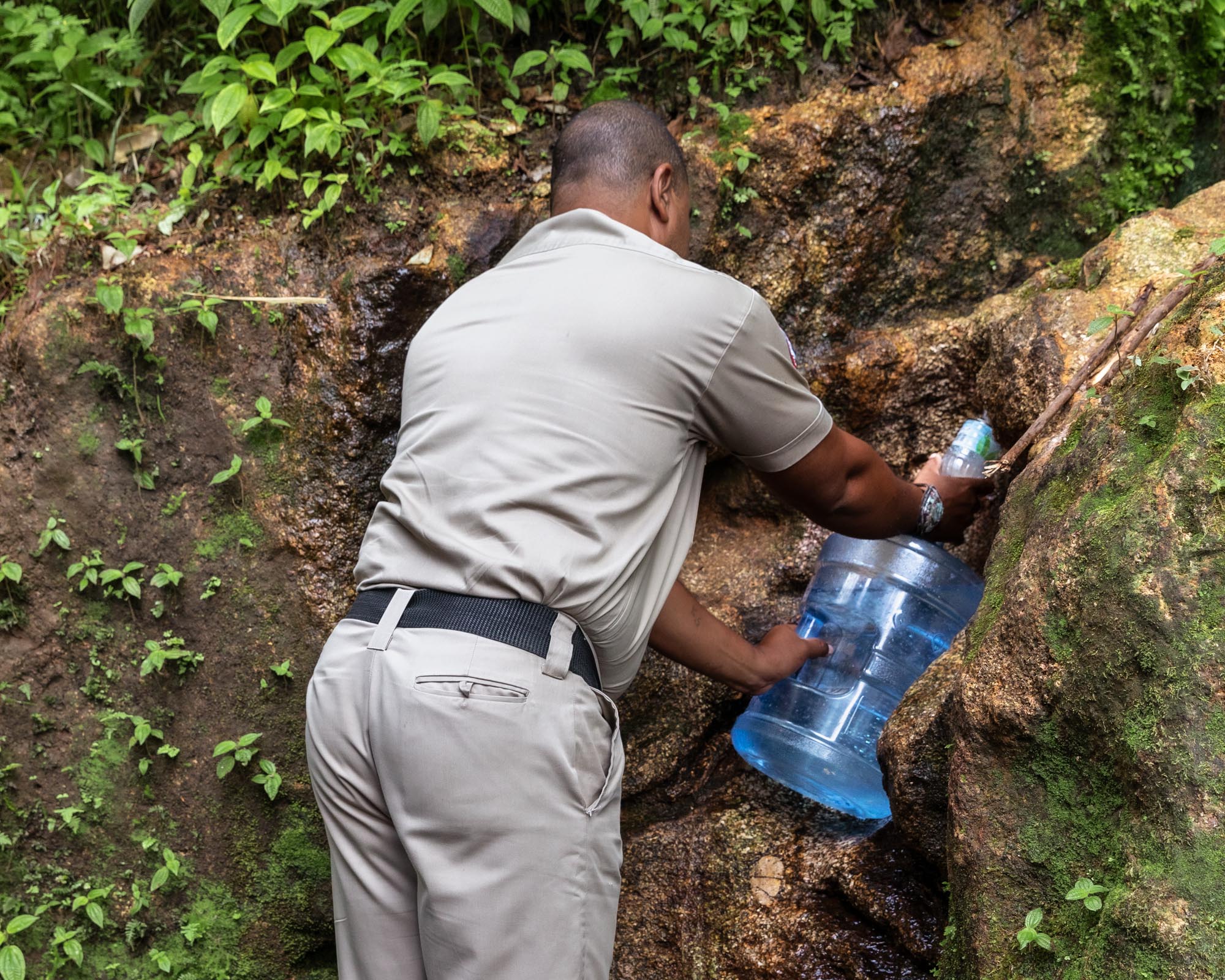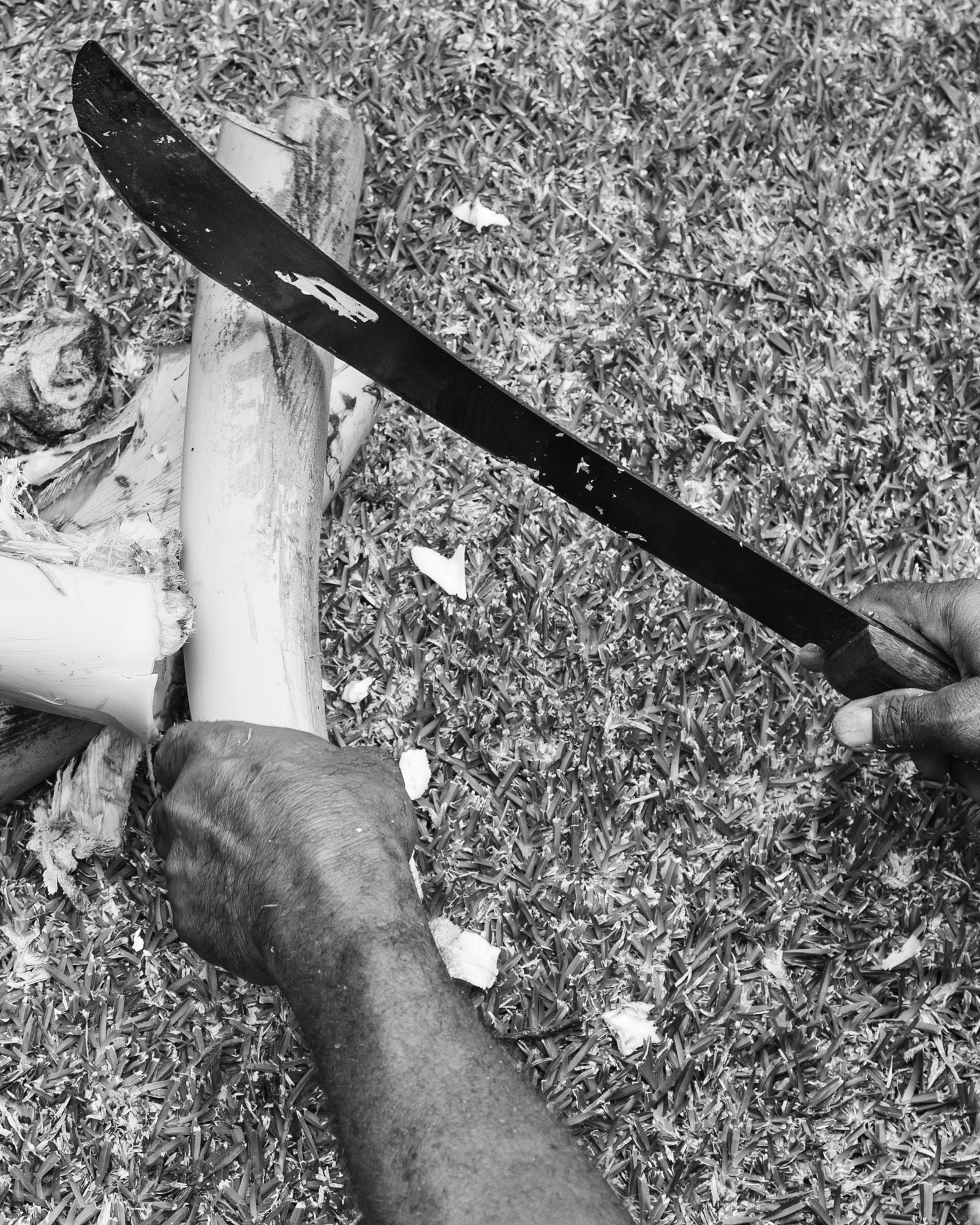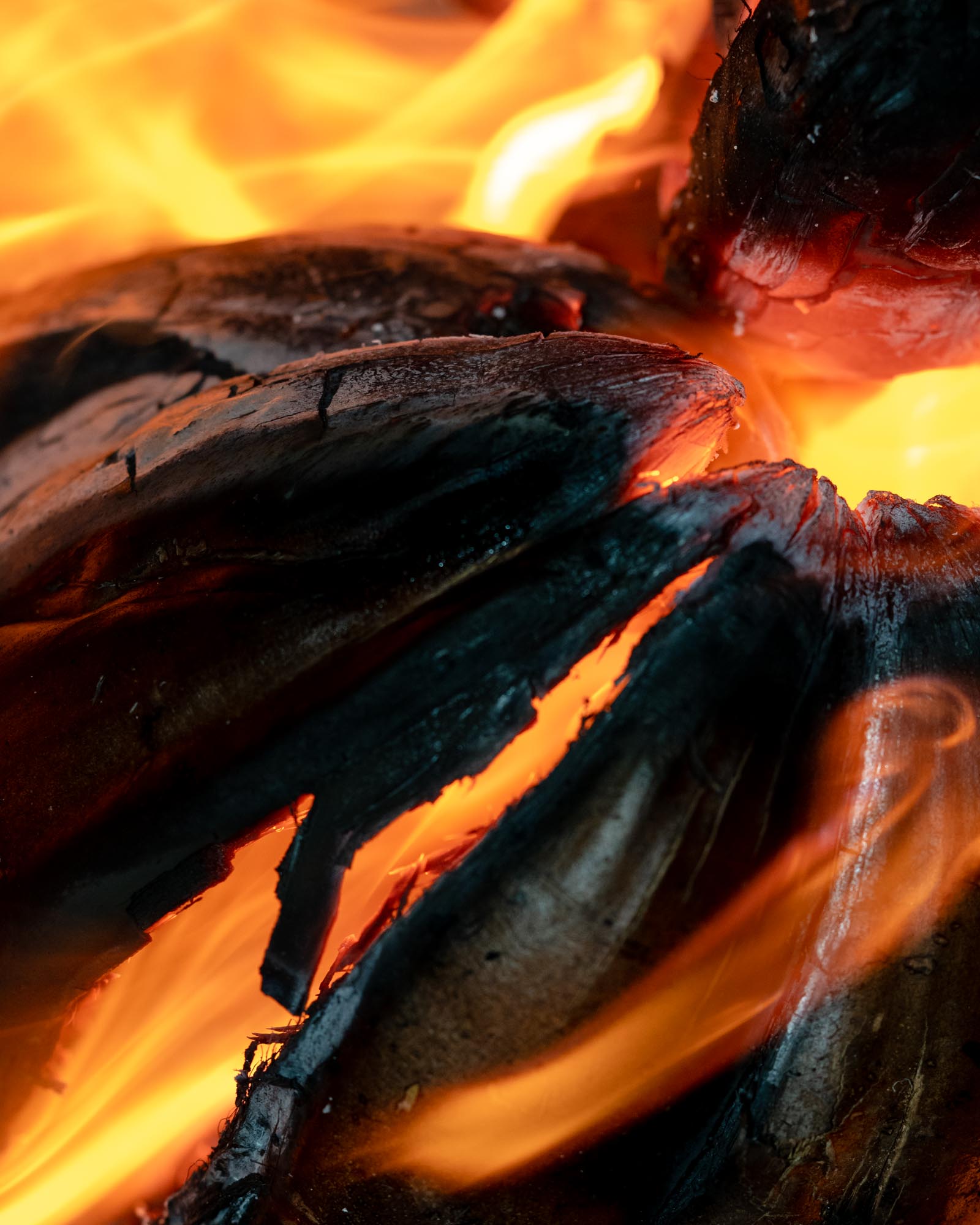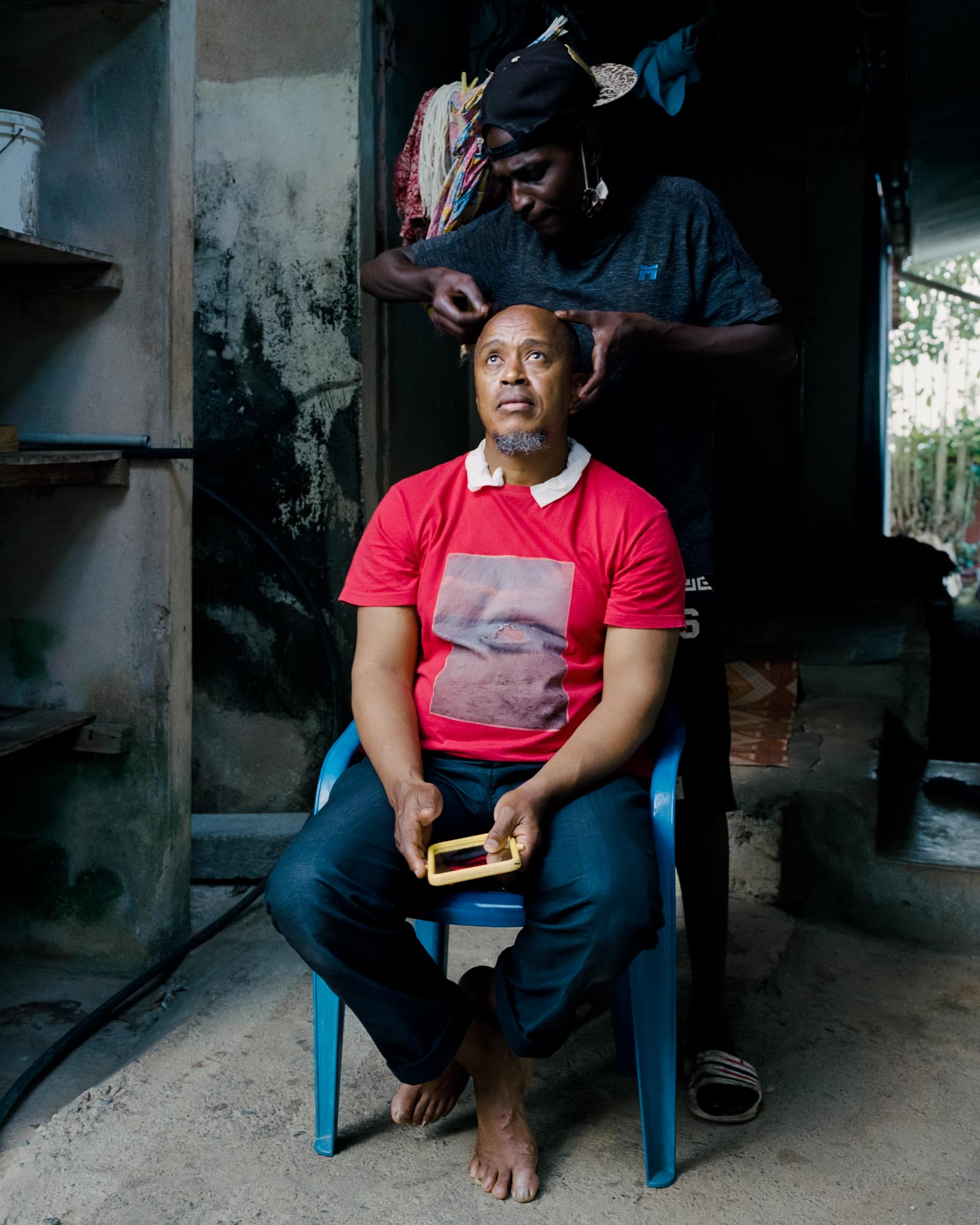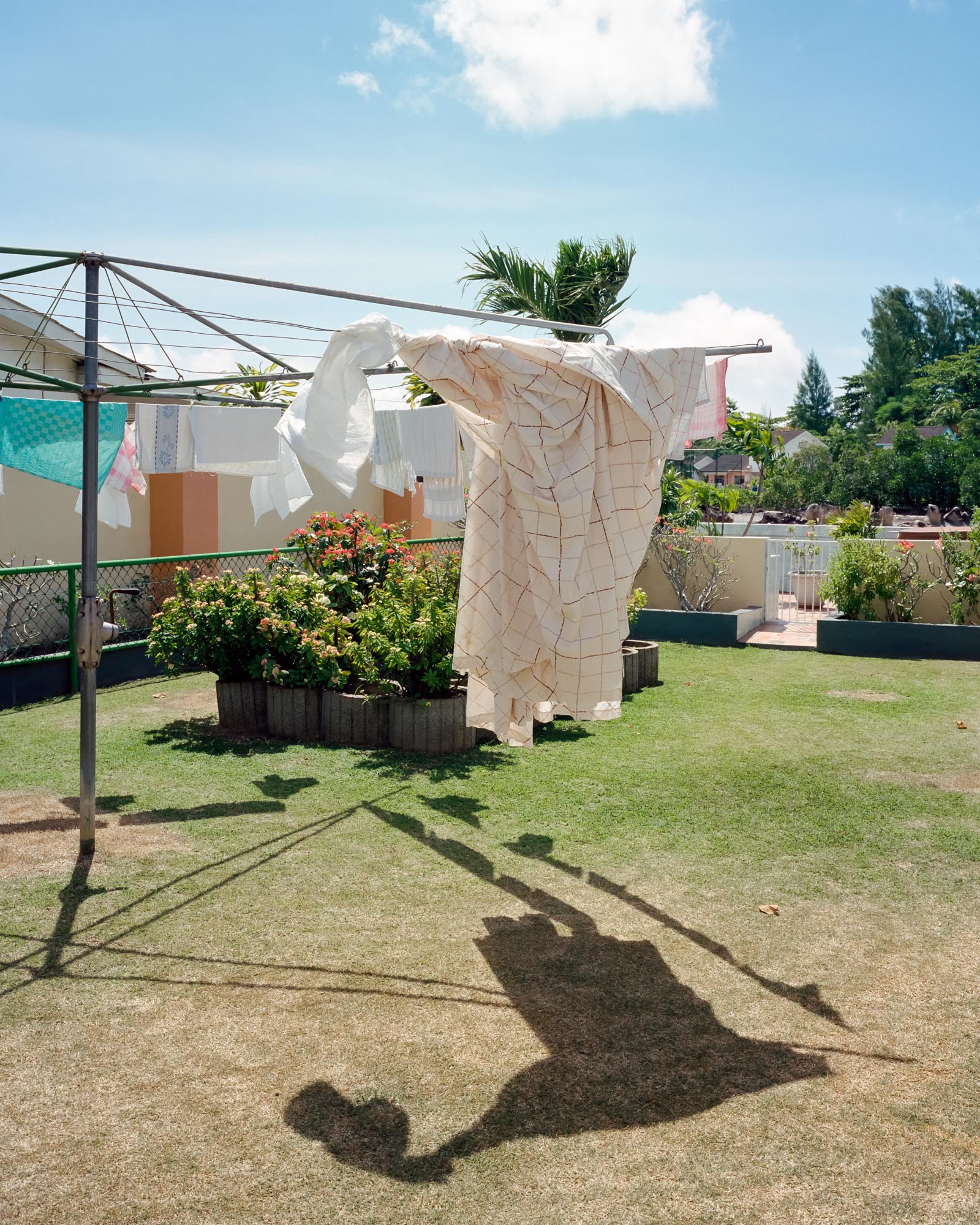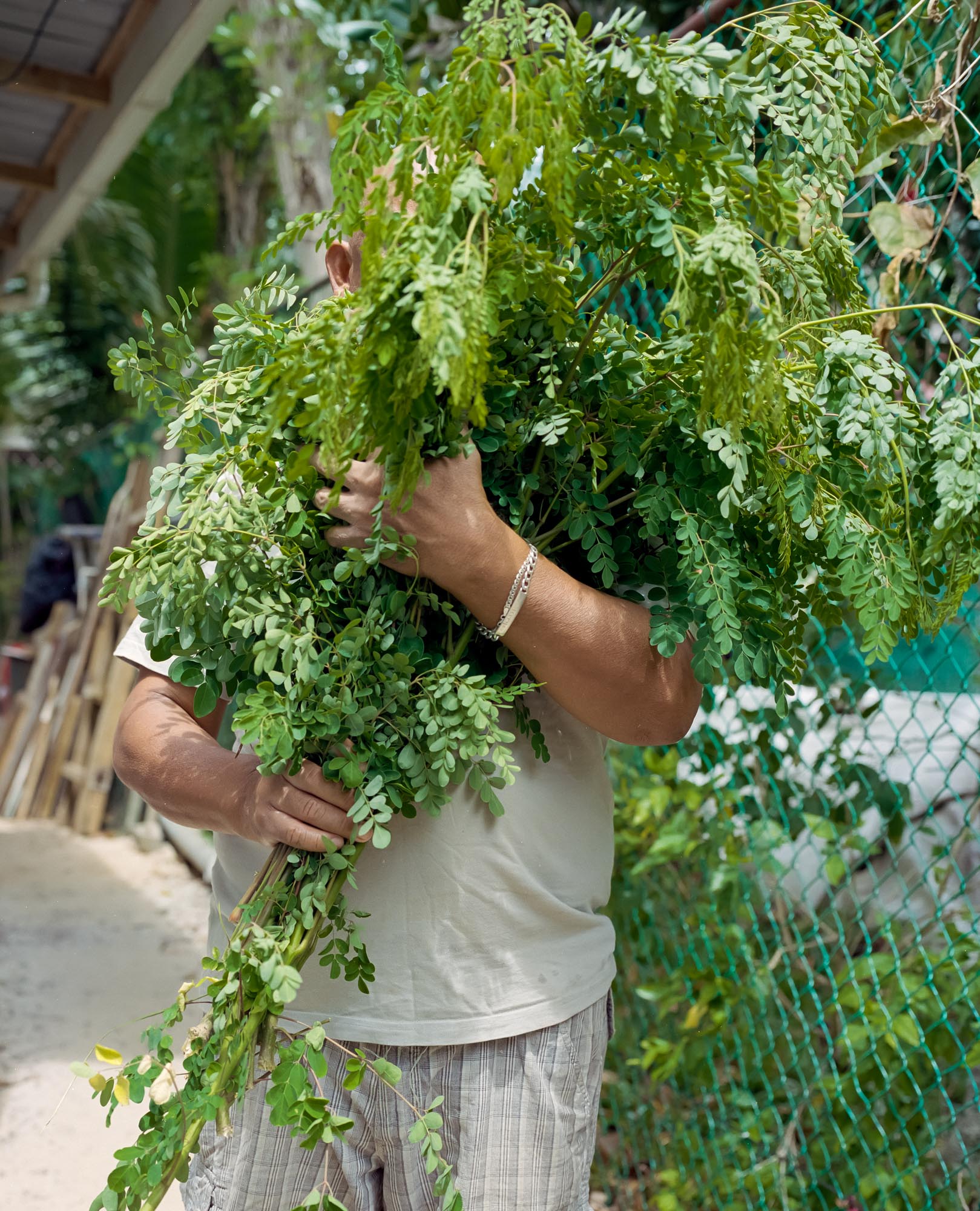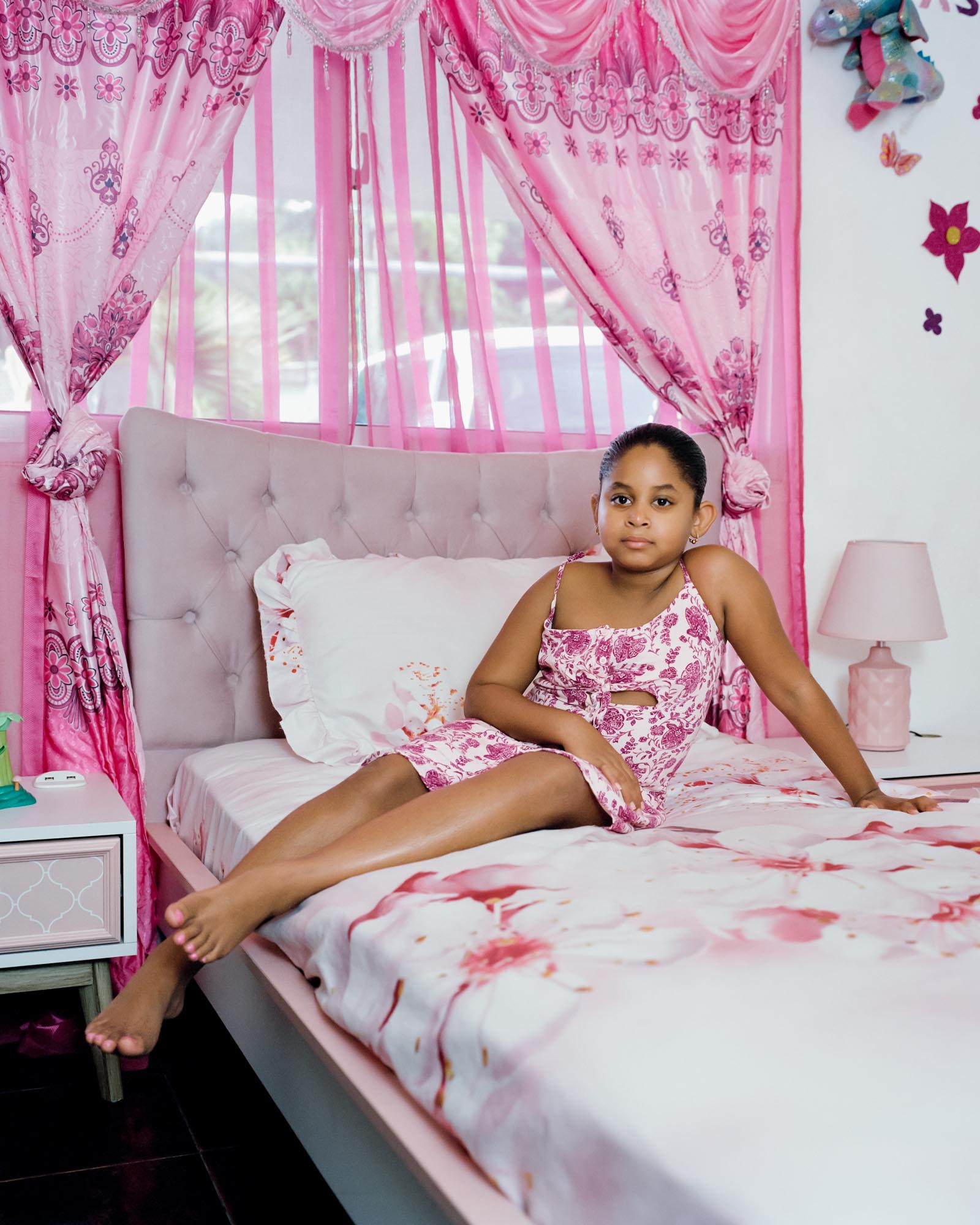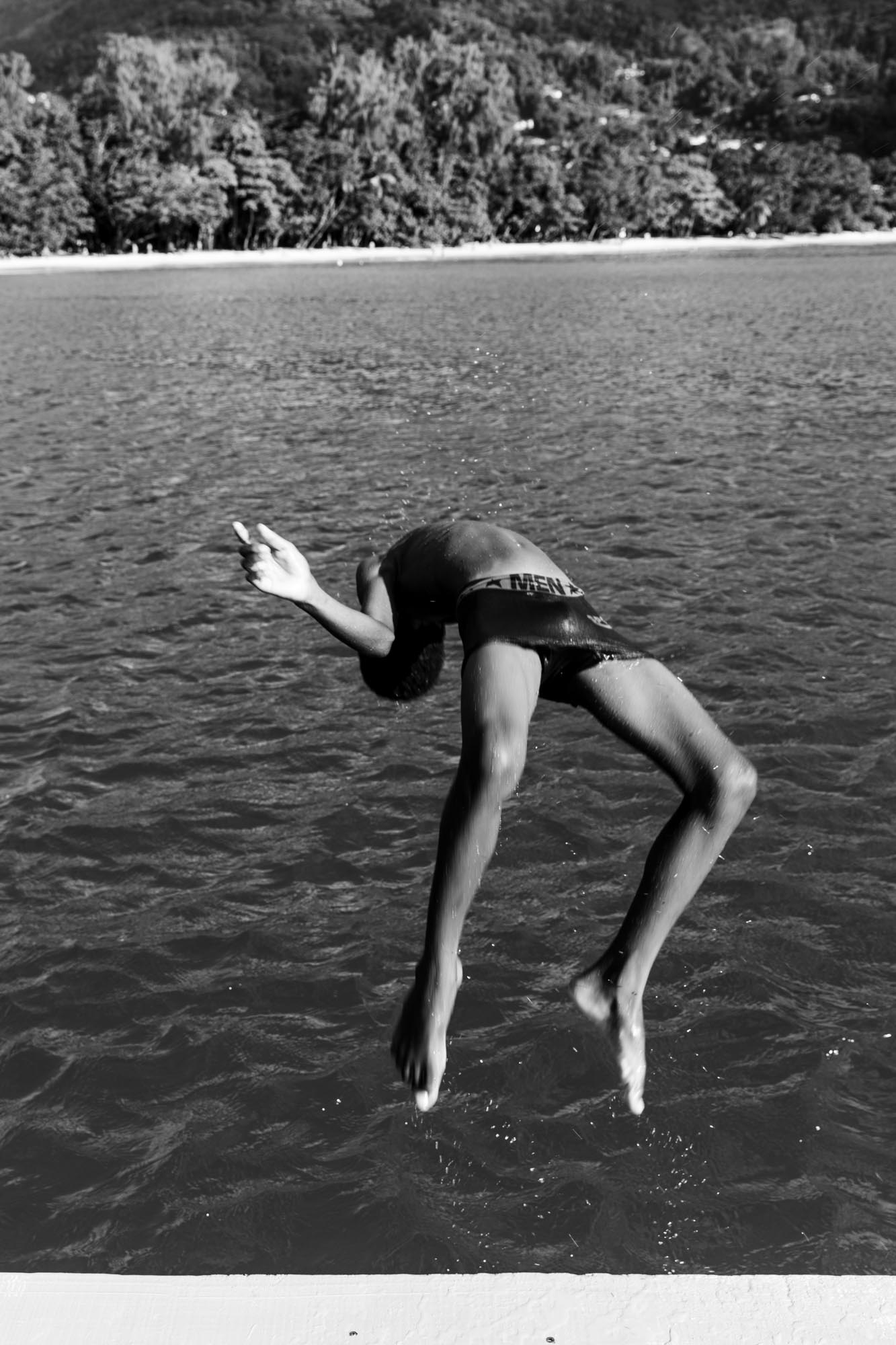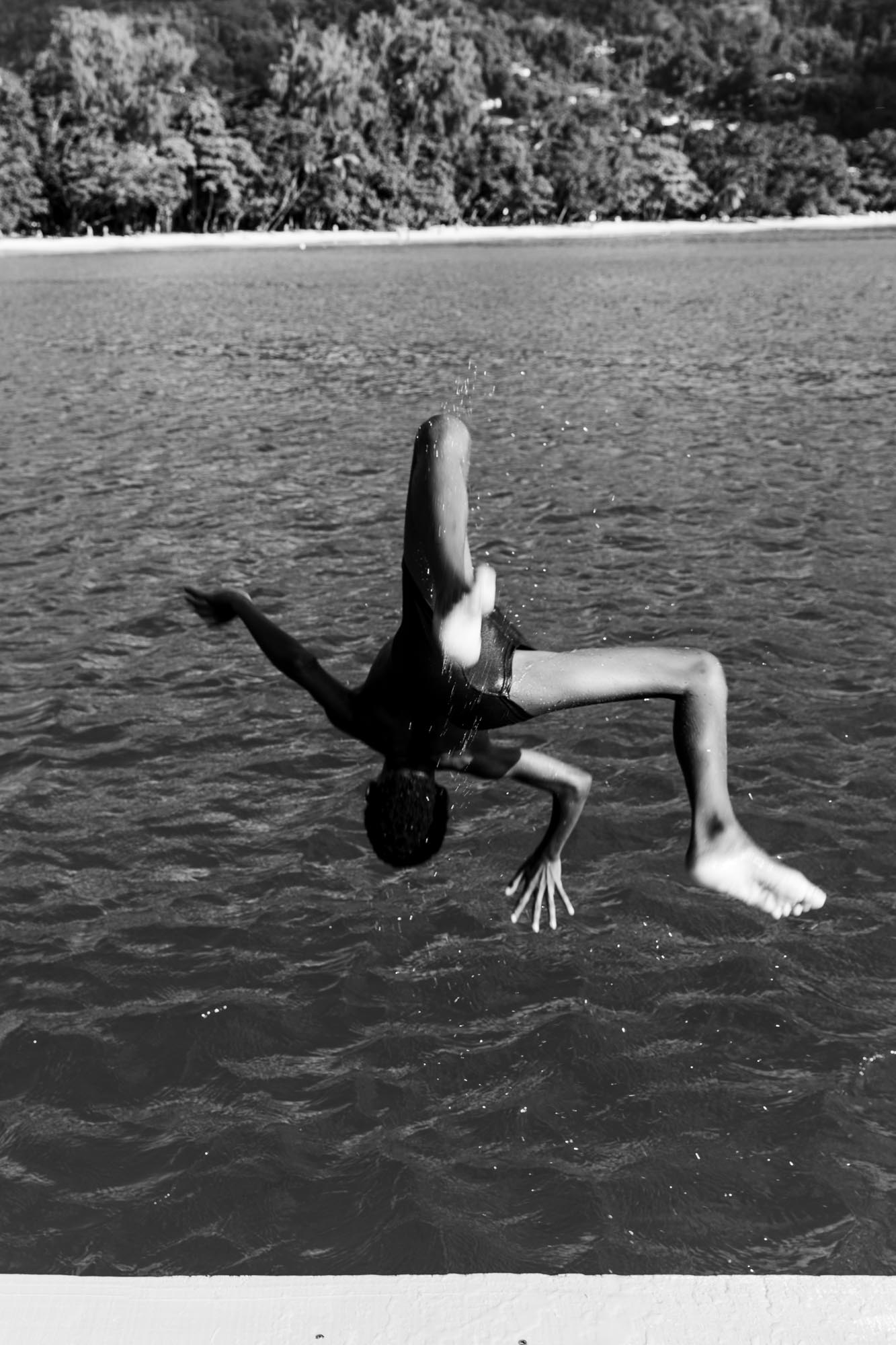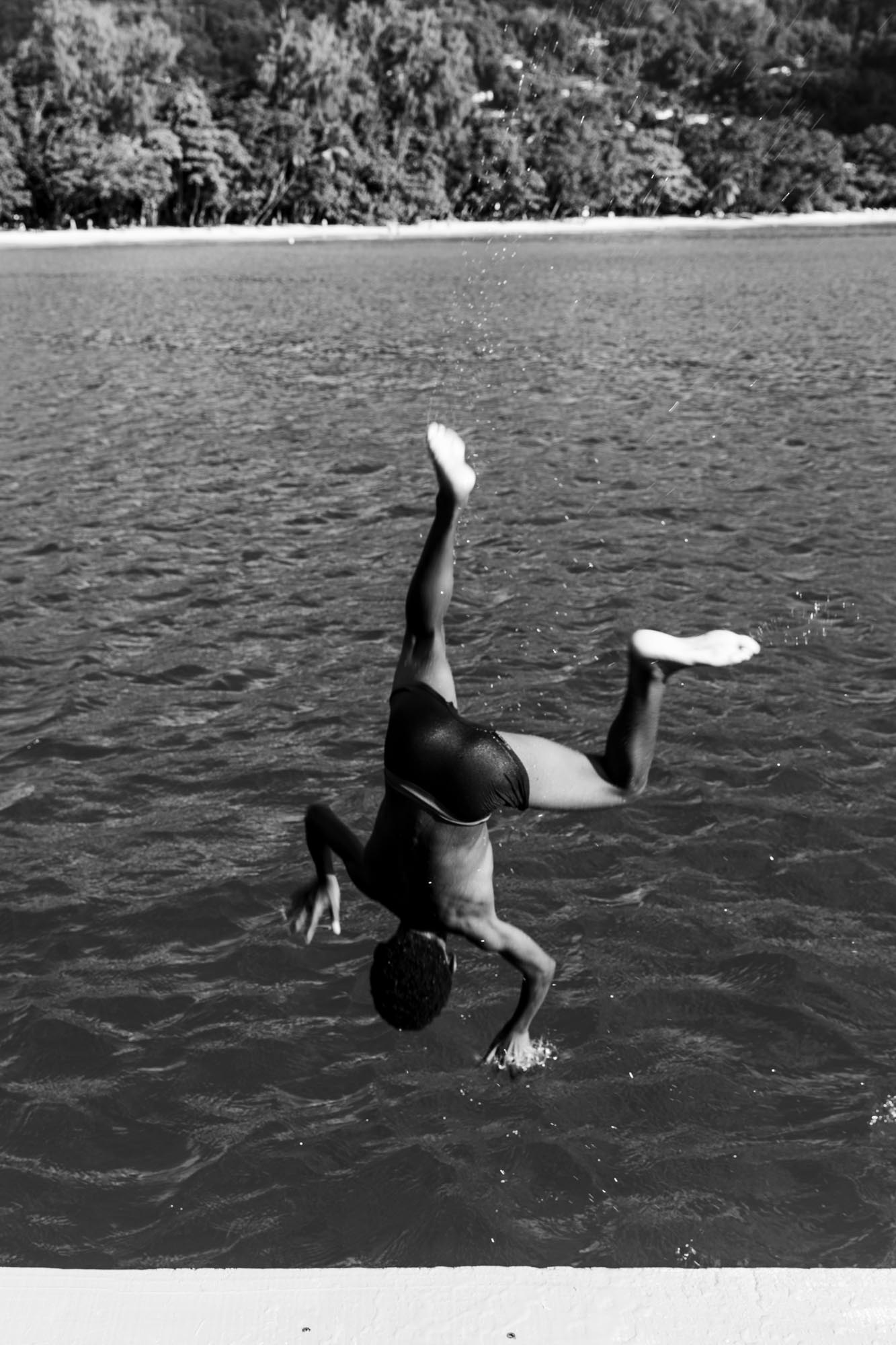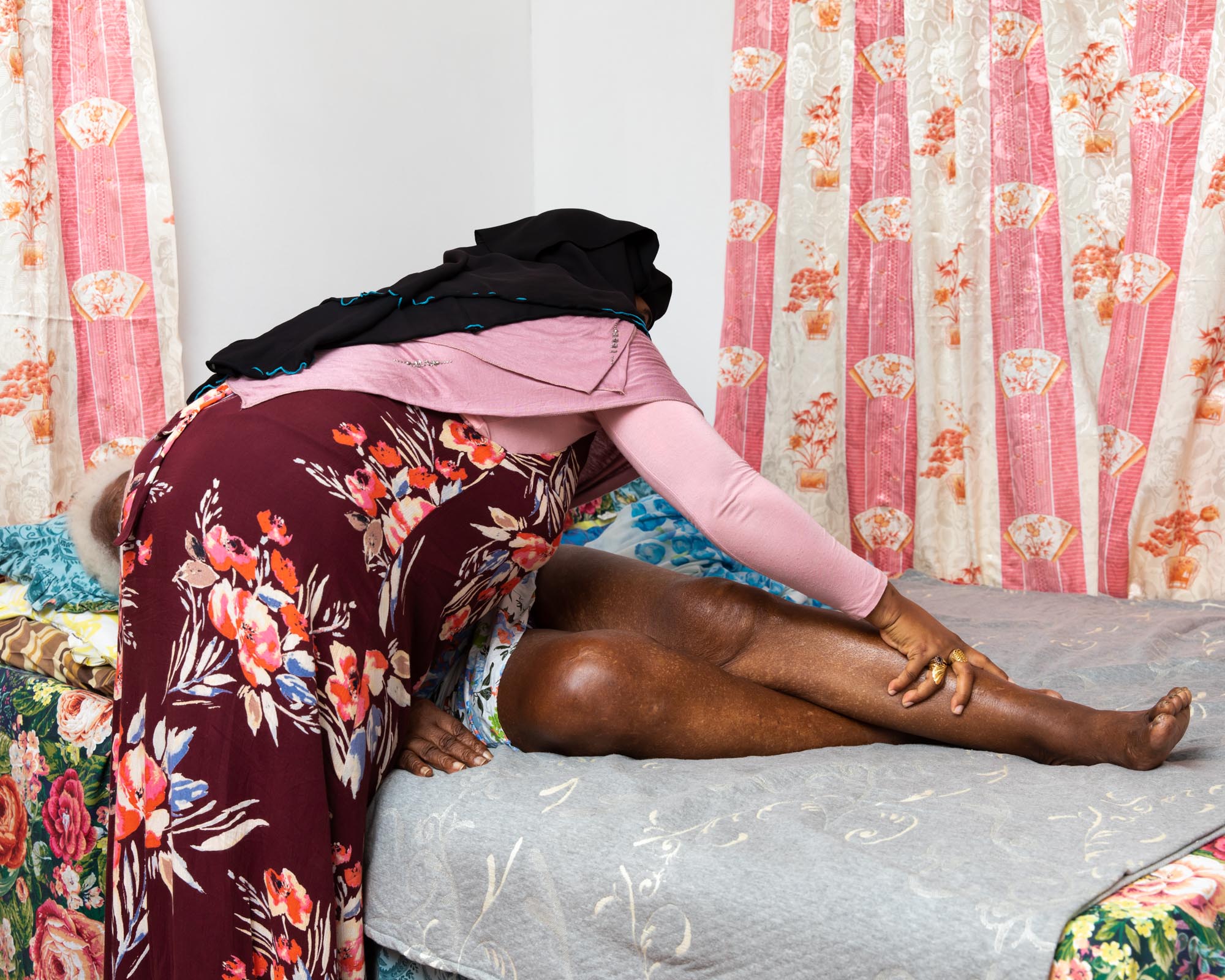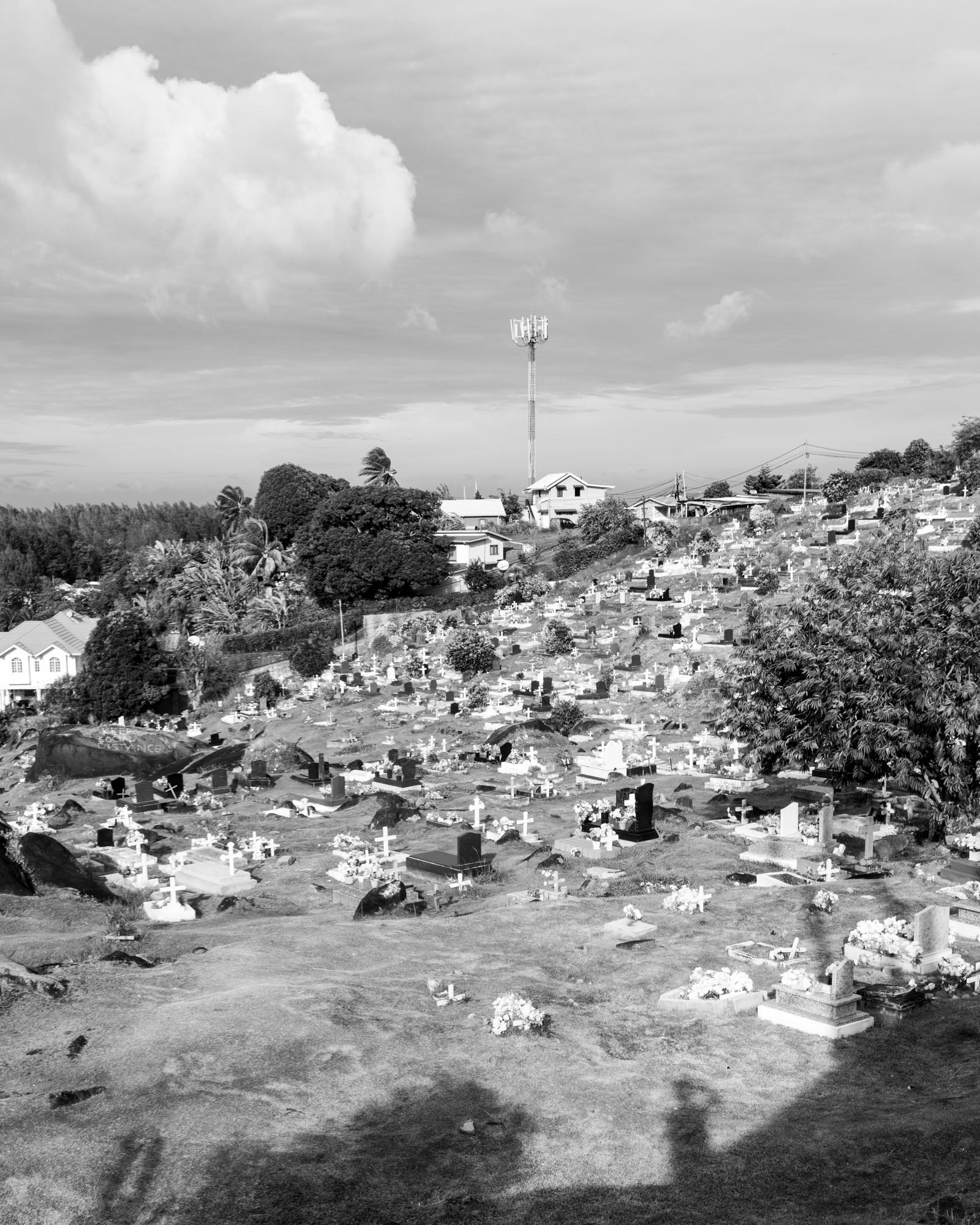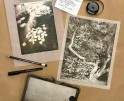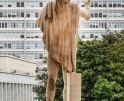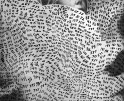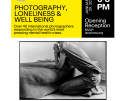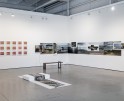Natasha Moustache: Lerozyon (L-EURO-ZHUHN)
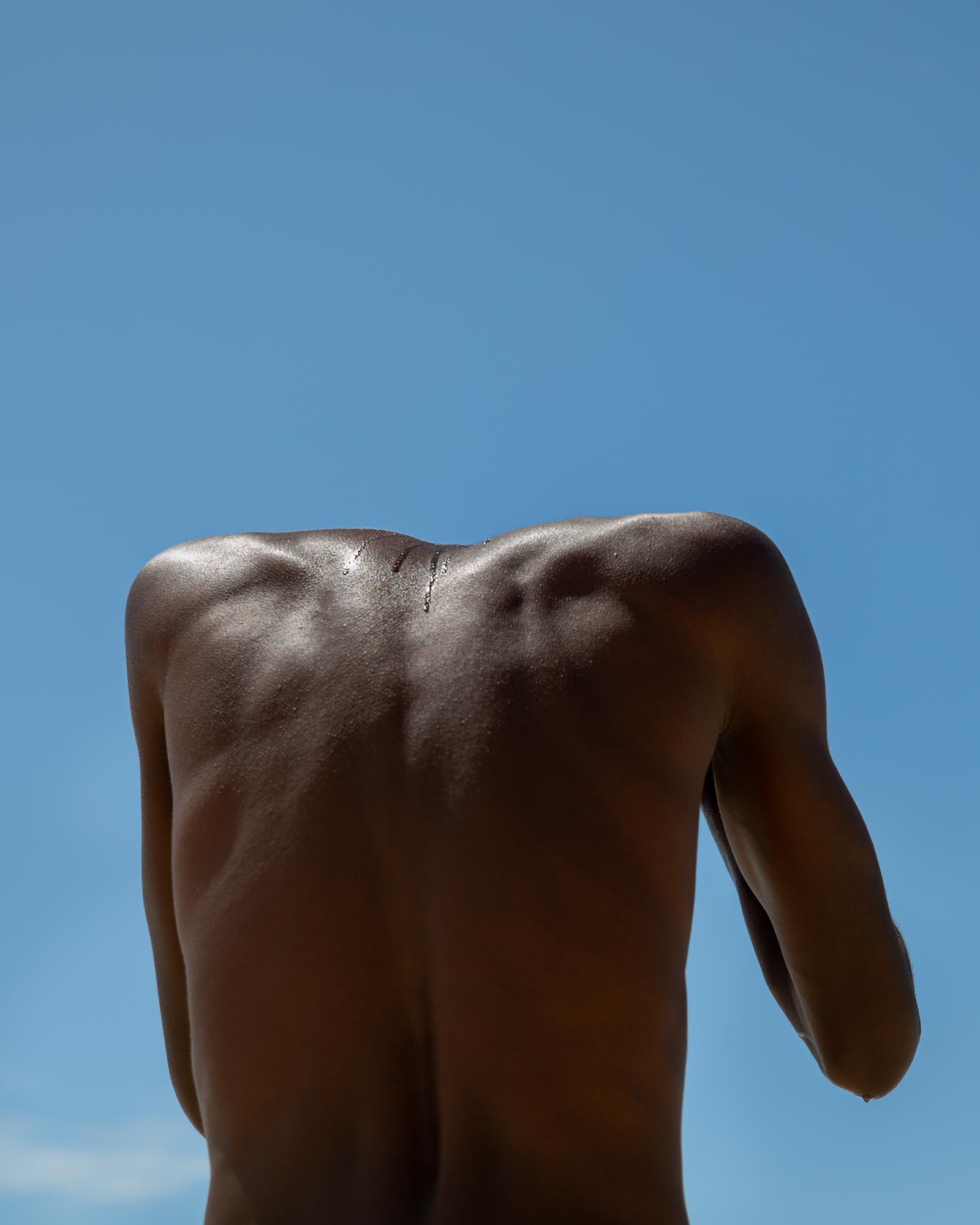
©Natasha Moustache, Pou Viv ek pou Lanmour Dans Sesel (To Live and Love in Seychelles), 32×40, 2021, Archival Inkjet Print
“I want my work to live in spaces that feel like home. If you see a chair, I invite you to sit a while. Listen. Be transported.” – Natasha via their Instagram @natashamoustache on 4/16/2023
Last month, I visited C33 Gallery-Columbia College Chicago to experience photographic installation artist Natasha Moustache’s solo exhibition: Lerozyon (L-EURO-ZHUHN)— a body of work birthed after their visit to Seychelles in the summer of 2021. Upon planning my trip to Chicago to experience their show, I knew that I would need an ample amount of time to spend with their work based on my prior experience of visiting their exhibition last summer at C33 Gallery, Under The Same Sun– another body of work of theirs I highly recommend checking out. By no surprise to me, this journey through Lerozyon (L-EURO-ZHUHN) was impeccable.
Every detail of Natasha’s work is intentionally and carefully chosen in a way that equally demands the attention that was placed into its making, and Lerozyon (L-EURO-ZHUHN) is no exception by far.
Natasha Moustache is a photographic installation artist currently based in Chicago, Il. Moustache’s work reflects their experience as a first-generation, Seychellois-American and explores the relationships between Black Diasporic communities within colonized spaces. Their work regularly engages strangers as long-term collaborator-participants, utilizing portraiture and the fabrication and re-imagining of the domestic spaces their collaborators occupy. Moustache seeks to bring the human community into a conversation with itself that transcends difference and emphasizes commonality by enveloping their photography in an experiential exhibition practice that moves beyond the traditional gaze.
Moustache’s work has been shown at the Lubeznik Center, Hyde Park Arts Center, the Houston Center for Photography, the International Center for Photography, and the Center for Photography at Woodstock where they were an Artist in Residence (2005). Their editorial work has been published nationally and internationally. Natasha received their MFA from Columbia College Chicago in 2021 where they were awarded the Stuart Abelson Travel Fellowship (2019).
Instagram @natashamoustache & @iammoustache
Lerozyon (L-EURO-ZHUHN) examines the daily rituals of cultural and botanical preservation that anchor the Seychellois people and traditions to their land despite an economic reliance on Western tourism and the steady cultural erosion endured as a result.
The Seychelles Islands, loosely tethered to the Horn of Africa, is an archipelago consisting of over 115 islands in the Indian Ocean. It has been called Paradise, the Original Colony, and the Garden of Eden. It is also where Natasha Moustache made thousands of portraits and vibrant landscapes while revisiting their grandparents’ homeland. Meticulously edited and exhibited within a lush, domestic installation Lerozyon (L-EURO-ZHUHN) brings humanity and dimension to the islands that moves beyond the paradisiacal facade that has outwardly defined it.
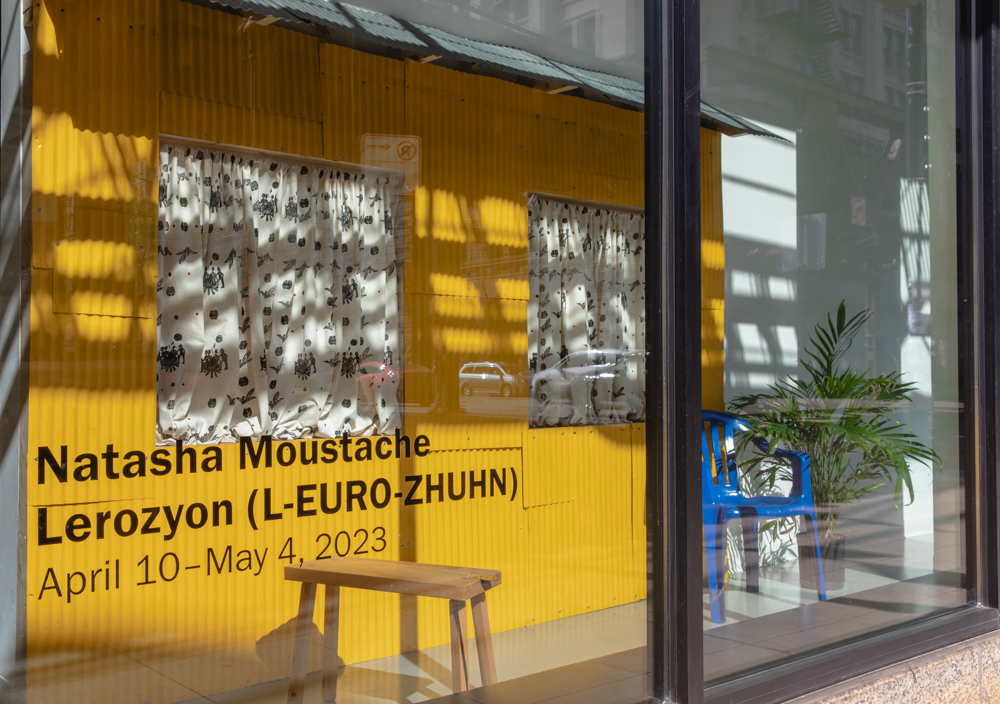
©Natasha Moustache, installation Lerozyon (L-EURO-ZHUHN) at C33 Gallery-Columbia College Chicago, 2023
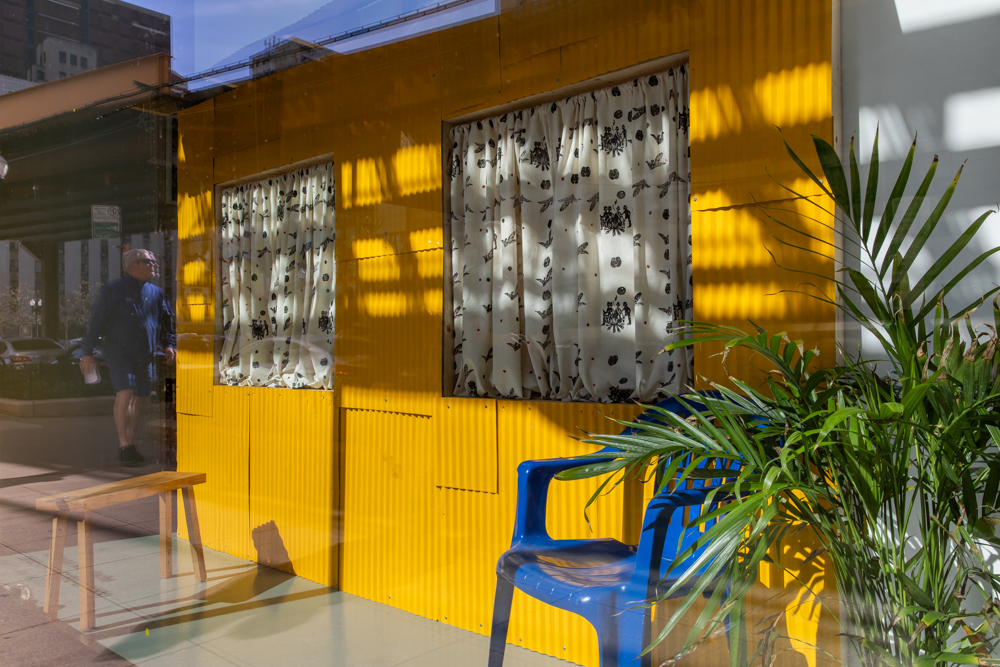
©Natasha Moustache, installation Lerozyon (L-EURO-ZHUHN) at C33 Gallery-Columbia College Chicago, 2023
By incorporating a combination of vibrant color and black-and-white photographs varying in size and placement, hand-made wallpaper, domestic decor, and an ambiance of sounds from nature, Natasha invites the viewer to examine the daily rituals of their family’s homeland in Seychelles through its immersive botanical presentation. The combination of these varying elements created a slow dance with me as I navigated and shifted throughout the space allowing me to come close and listen or simply exist in its stillness. Above all else, I was given permission to non-destructively experience Seychelles through Natasha’s eyes.
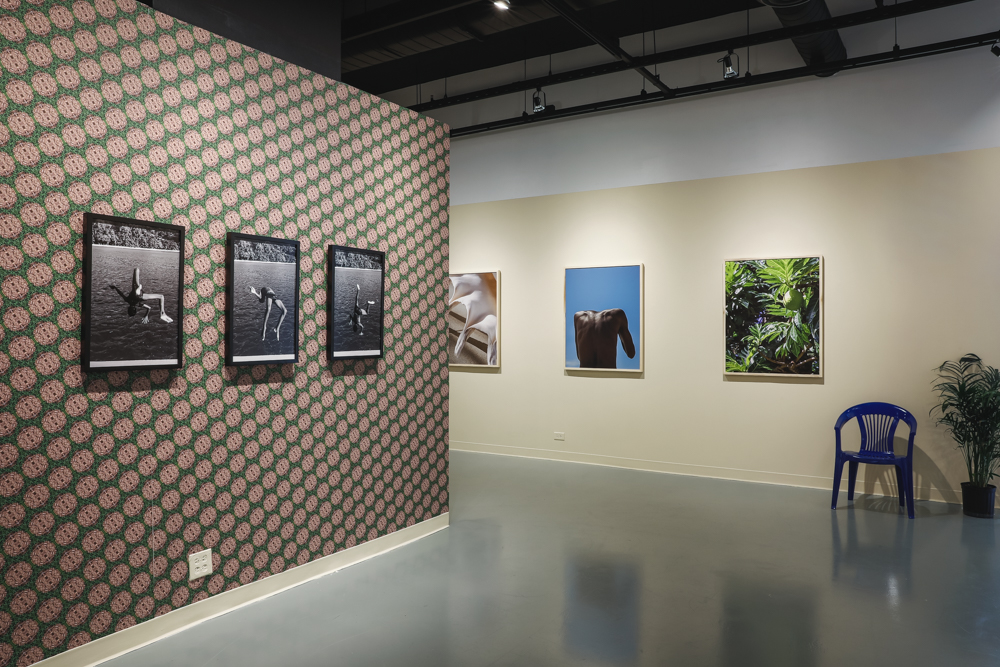
©Natasha Moustache, installation Lerozyon (L-EURO-ZHUHN) at C33 Gallery-Columbia College Chicago, 2023
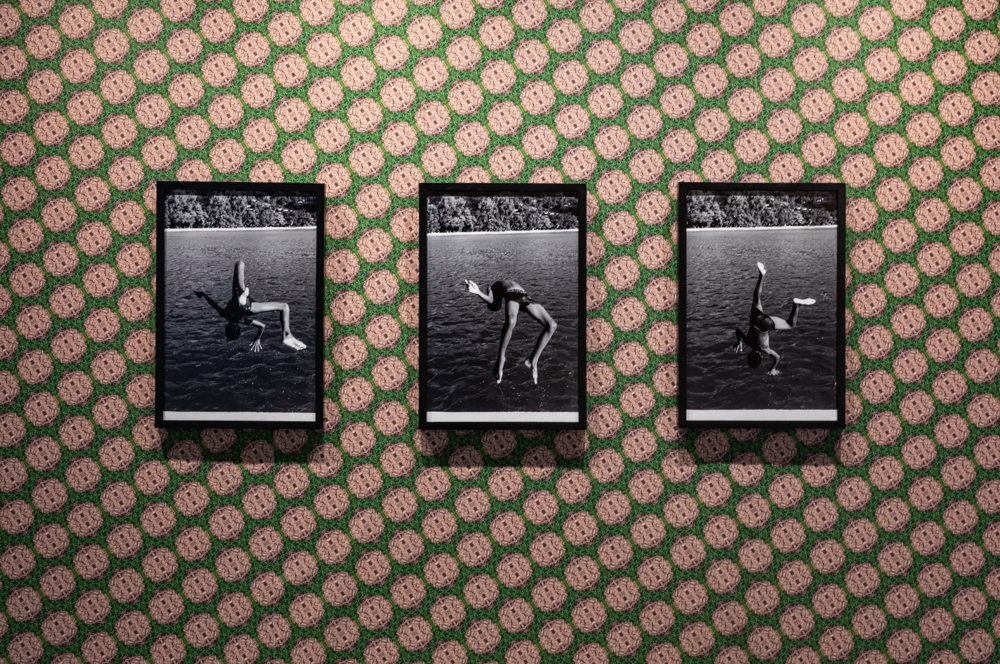
©Natasha Moustache, installation Lerozyon (L-EURO-ZHUHN) at C33 Gallery-Columbia College Chicago, 2023
In a strategically placed photographic installation in the back corner of the room, a hand-made wallpaper depicting botanical scenery and 2 large-scale portraits– one depicting a young person propped up on their bed and the other portrait of an adult person also propped up on their bed– shared a corner. They are making eye contact with the viewer displaying a faint smile in their domestic space that is adorned with floral patterns whether in the space or on their clothing. The shared corner, the sense of pride, and the fine inclusion of the various botanical details within the domestic spaces of people in two different generations echo the very pride and respect that the people of Seychelles have for their home and the people therein.
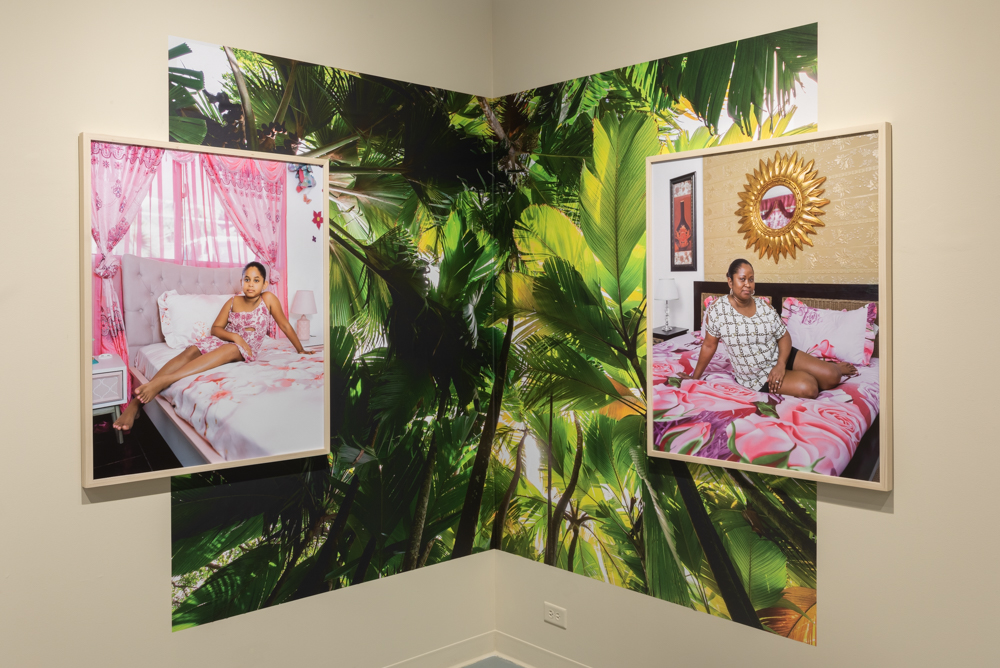
©Natasha Moustache, installation Lerozyon (L-EURO-ZHUHN) at C33 Gallery-Columbia College Chicago, 2023
While I have talked the most about the visual components of the exhibition itself, I can’t leave out another very important way that the exhibition spoke to me as well– through language. Each image, including the very name of the exhibition itself, is translated or phonetically transcribed. This quiet act of translating provided me with an open invitation to meet the work halfway. Every title is intentionally crafted to show the ties between the care of the land, the care of the community, and the traditions that are passed down.
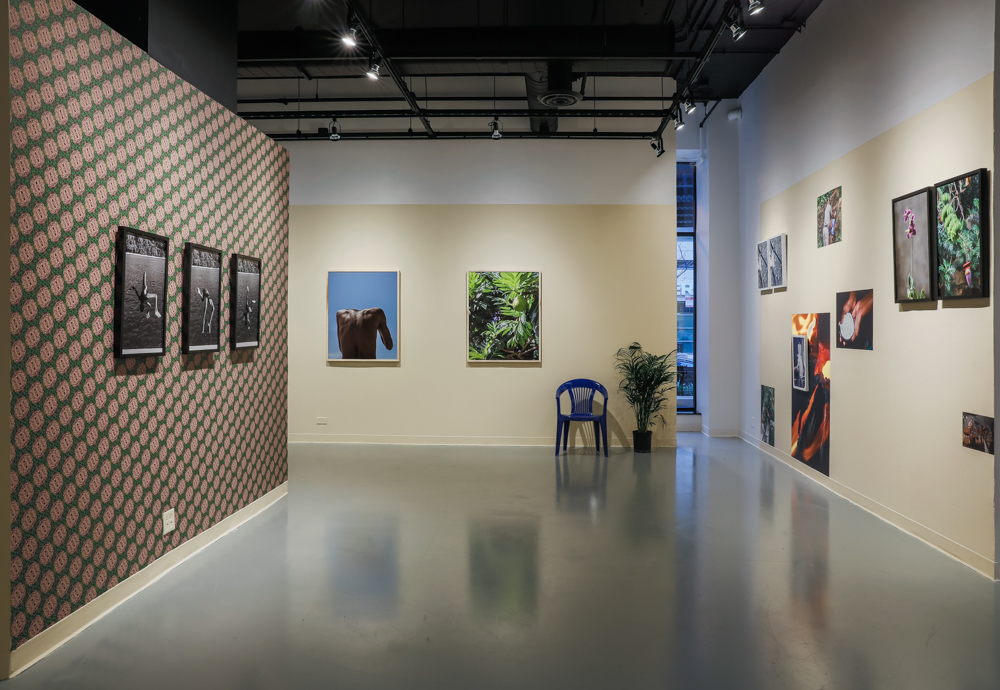
©Natasha Moustache, installation Lerozyon (L-EURO-ZHUHN) at C33 Gallery-Columbia College Chicago, 2023
Nearing the end of the exhibition, I encountered a domestic setup similar to what I would see in my grandmother’s home. A set of wooden chairs were placed in front of a wooden coffee table holding a photo album filled with traditional family photographs. With this presentation set before me, I couldn’t help but make myself at home with the work and spend time with it. Flipping through the photo album, I found myself smiling along with the images as I witnessed the many smiling faces, the beautiful scenery, and various public and domestic spaces. At that moment, it struck me that home is a feeling just as much as it is a space. In a way that I find an intentional artistic decision on Natasha’s part, I found myself reflecting upon the work as if Natasha’s family and neighbors were my own. This subsequently made me reflect on my family, the traditions we take care of, why we take care of them, how they sustain us, and the remnants we leave behind– one of several underlying messages of Lerozyon (L-EURO-ZHUHN). After all, the photo album is a space that cements the ever-fleeting present so that it may exist as a remnant of the past.
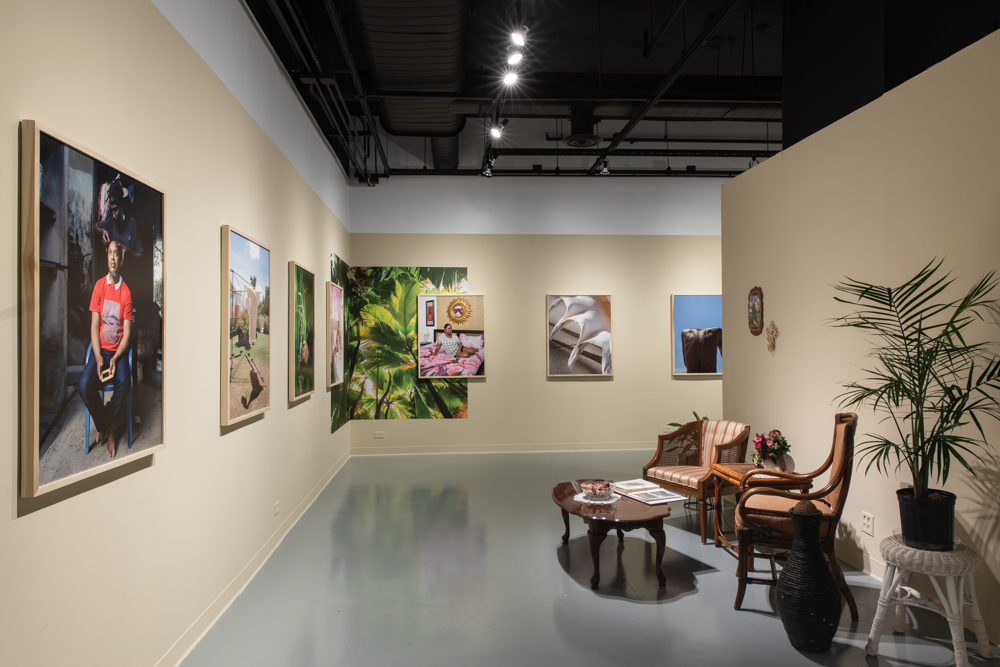
©Natasha Moustache, installation Lerozyon (L-EURO-ZHUHN) at C33 Gallery-Columbia College Chicago, 2023
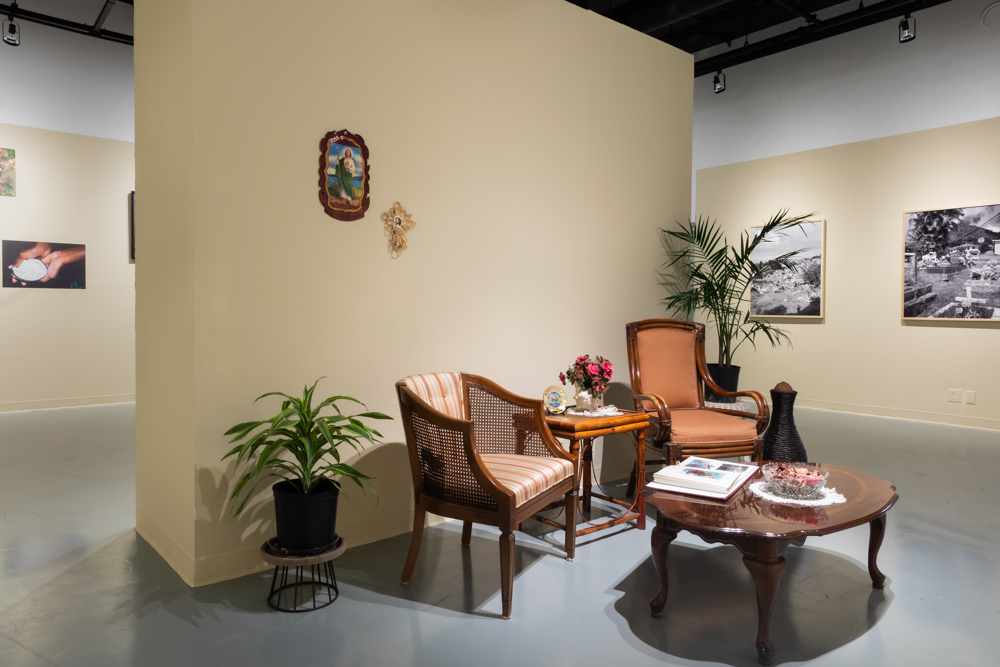
©Natasha Moustache, installation Lerozyon (L-EURO-ZHUHN) at C33 Gallery-Columbia College Chicago, 2023
As visually and sonically appealing as this exhibition was, there was also a part of me that experienced slow-burning grief. While I admire the beauty of the land through the photographs and the people therein, I couldn’t help but remember the slow death of the land enacted by Western tourism and the understood need for it economically. It is an uneasy dance between preserving the land and all of its glory, and mending the land from tourist-inflicted erosion. With this work, there is so much more than meets the eye. The beauty of the land and the connectedness of the people of Seychellois are upheld by generations of maintenance, care, and protection. With the curious mind that I bear, my imagination naturally drifts to the thought of who takes care of the people who are taking care of the land beyond themselves.
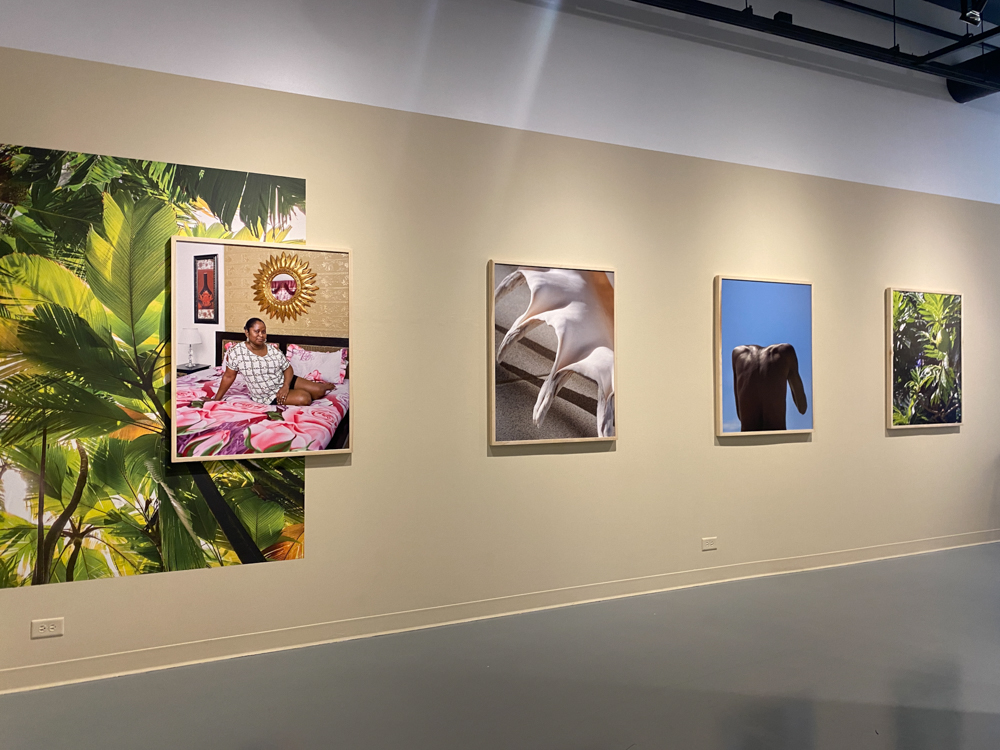
©Natasha Moustache, installation Lerozyon (L-EURO-ZHUHN) at C33 Gallery-Columbia College Chicago, 2023
Surrendering to the work and making a conscious effort to listen and understand was all that I knew I needed to do upon viewing Lerozyon (L-EURO-ZHUHN), and I gave it my full attempt to meet the work halfway– something I recommend all viewers do with the works that they encounter. Through Natasha’s conscious decisions throughout the making of this work and its subsequent installation, I was given a well of permissions– the permission to exist, to question, to mourn, to smile, to rest, and to simply just be. I left the space feeling warm and cool simultaneously, with the cold only existing in the act of leaving itself; yet leaving also forced me to think about the traces that are left behind and even more deeply, Seychelles and the Seychellois community.
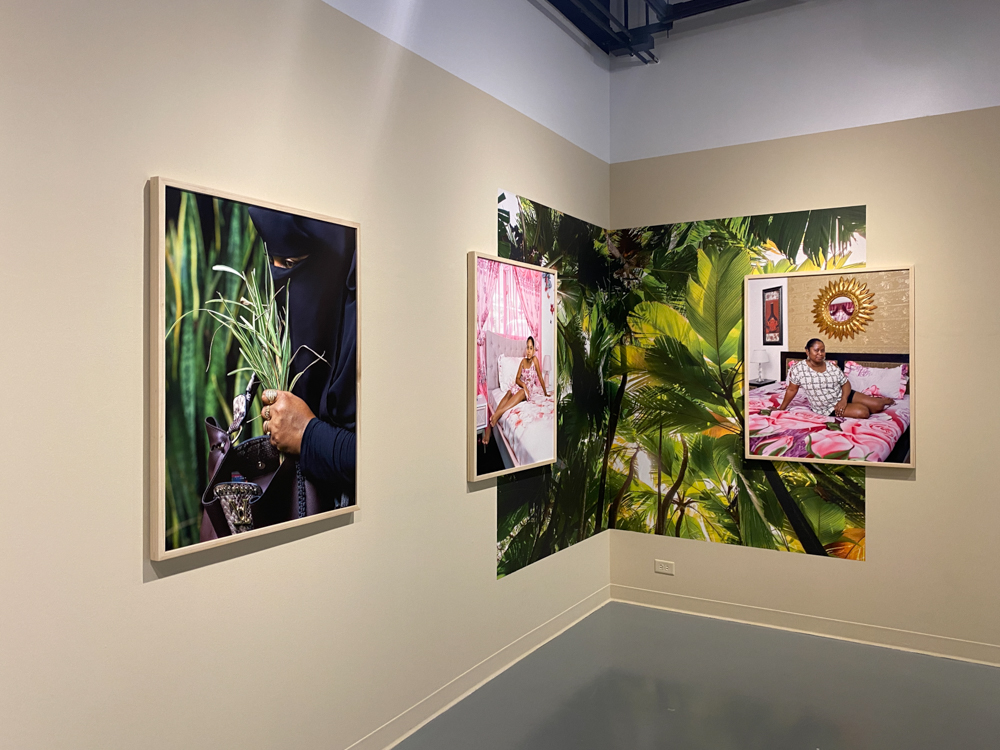
©Natasha Moustache, installation Lerozyon (L-EURO-ZHUHN) at C33 Gallery-Columbia College Chicago, 2023
Natasha’s works aren’t meant to just be viewed. They’re meant to be experienced and communed with. The work, and subsequently Natasha (or vice versa), takes you by the hand to carefully guide you and you follow. It’s always safe to follow.
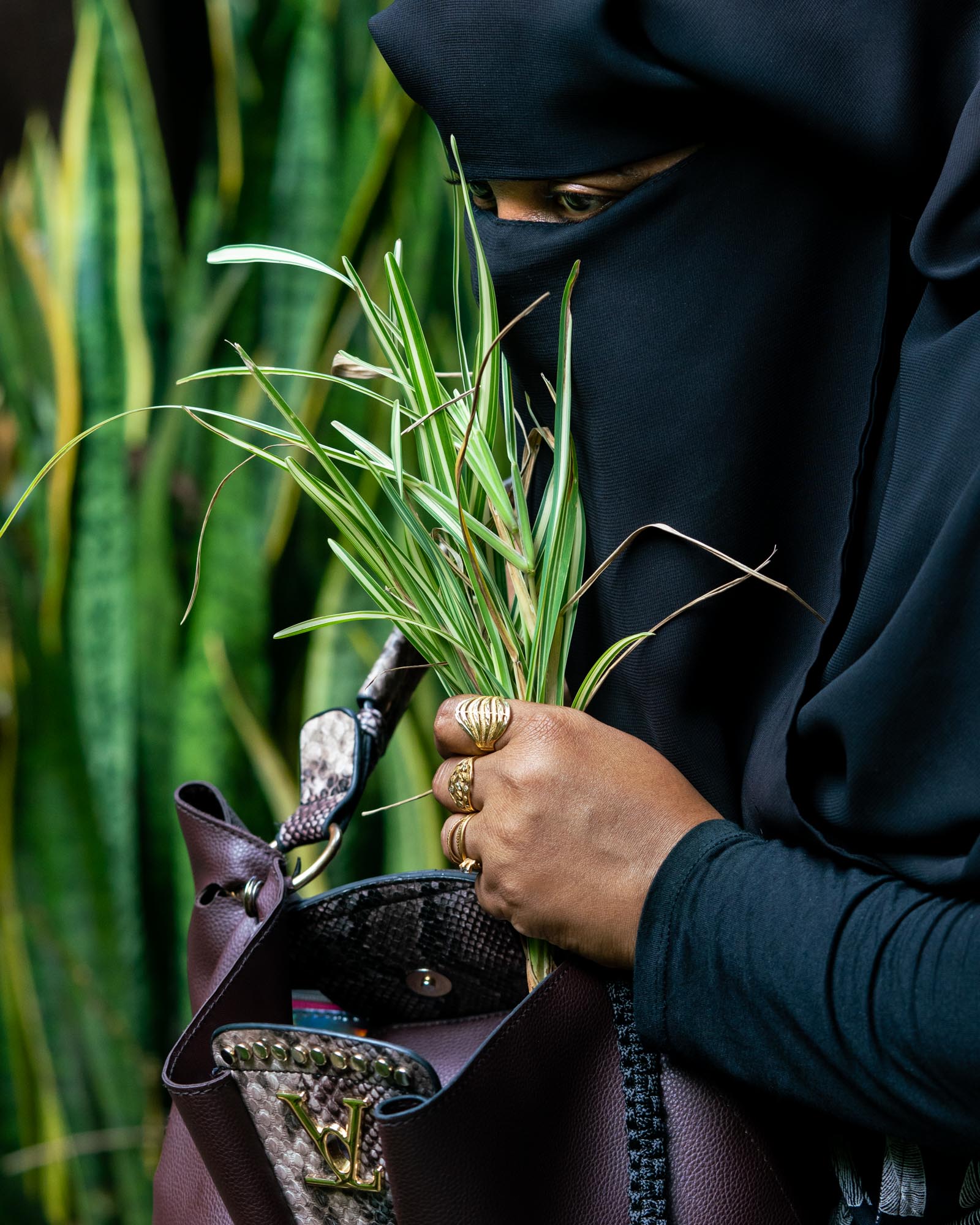
©Natasha Moustache, Pou Mwan e pou Ou, Laila avek Citronel (What’s Mine is Yours, Laila with Lemongrass 32×40, 2021, Archival Inkjet Print
Posts on Lenscratch may not be reproduced without the permission of the Lenscratch staff and the photographer.
Recommended
-
Beyond the Photograph: Editioning Photographic WorkJanuary 24th, 2026
-
Ben Alper: Rome: an accumulation of layers and juxtapositionsJanuary 23rd, 2026
-
Reservoir: Loneliness, Well-Being and Photography, Part 2January 22nd, 2026
-
Reservoir: Loneliness, Well-Being and PhotographyJanuary 21st, 2026
-
Dawn Roe: Super|NaturalJanuary 4th, 2026

